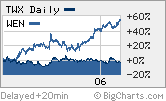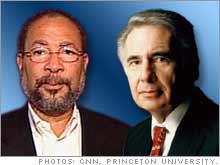|
Do's and don'ts for corporate raiders
Peltz got three board seats at Wendy's while Icahn fell flat in his campaign against Time Warner management. Here's a look at why.
NEW YORK (CNNMoney.com) - Famed corporate raider Carl Icahn made his fortune forcing change at public companies, but his highly publicized campaign against Time Warner fell flat. But another well-known raider, Nelson Peltz, just won a big victory in his battle with Wendy's. Why do some "shareholder activists" -- fund managers who scoop up large stakes in a company and then campaign for changes -- walk away victorious, while others retreat with little to show for their hard work? The answer, in a word, is investors.
One thing the successful campaigns have in common: they got big, normally passive institutional investors on board. People in the business say what makes an activist campaign truly successful is not just the opening salvo, but how well a manager does in rounding up these big investors -- often mutual funds or other managed funds whose managers are not shareholder activists themselves. "The key swing vote is the passive investors who decide whether to piggyback on what the activists are doing," said Whitney Tilson, managing partner of New York-based investment firm T2 Partners, which runs both hedge funds and mutual funds. "For every dollar of activist money involved in a campaign, there is usually at least $10 of non-activist money involved." Tilson, co-founder of the Value Investing Congress investment symposium and a long-time value investor, said that though his firm doesn't typically agitate for change, it will happily back an activist campaign if he feels it will ultimately result in unlocking so-called hidden value for shareholders. One example is fast-food chain Wendy's, which has been the target of activists including billionaire investor Nelson Peltz's Trian Partners and an earlier campaign by Bill Ackman of Pershing Square Capital. Peltz's campaign against Wendy's (Research), waged in conjunction with hedge fund Sandell Asset Management, resulted in Peltz winning three seats on the company's board of directors. The nation's No. 3 burger chain also agreed to consider options for its lagging Baja Fresh Mexican food outlets and had earlier agreed to accelerate plans to spin off its Tim Horton's coffee and donuts chain after Ackman's campaign. "We saw Wendy's was languishing at $40, but when we saw Pershing Square's proposal, it was clear that the shares were worth $65," Tilson said. Not all campaigns work
But not all campaigns work. While Carl Icahn won some concessions fromTime Warner (up $0.03 to $17.24, Research), his campaign fell well short of installing his own slate of directors and splitting Time Warner into four separate companies. (Time Warner is the parent company of CNNMoney.com.) "If you just come in and throw a hissy fit you're just going to get ignored, which is sort of what happened with Icahn," said Tilson. "Most investors ultimately concluded that (Time Warner CEO Richard) Parsons was dealt a tough hand and has been doing the right thing." Tilson said Icahn's campaign did accomplish some positive results for shareholders, such as Time Warner's announcement that it would ramp up its share buyback to $20 billion, cut $1 billion in costs by the end of 2007 and nominate two independent directors to its board. "But Icahn was asking for a mile and they gave him 100 yards," he said. Patrick McGurn, executive vice president of proxy advisory firm Institutional Shareholder Services, said the entrenchment tactics companies used to fend off corporate raiders in the 1980s -- such as enacting "poison pill" takeover defenses or appointing directors who weren't independent -- are the kinds of steps that usually backfire against today's targets. Such steps nowadays could very well end up wooing other investors to a dissident's cause. "The more entrenchment steps a board takes, the more the shareholders will start to side with the dissident in those cases," McGurn said. Icahn Partners did not return a call for comment. Focus-grouping a campaign
Phil Goldstein, founder of Bulldog Investors, which runs the Opportunity Partners activist funds, agreed that making sure a company's investors would be on board with an activist campaign is a critical step, but added that in most successful campaigns, the dissident agitating for change is generally correct in analyzing a company's problems. "You have to win the hearts and minds of the shareholders, but you have to be right," he said. "You do a little bit of pre-proxy communications...call up some of the larger shareholders and ask what they think of management and what they'd do if they were in charge." The most important step of all, activists say, is making sure you're right in the first place. And even if you are, make sure your target's other investors will support you. "Never go after a company that has credibility with its shareholders," said Robert Chapman Jr., who re-launched his Chapman Capital activist hedge fund firm this year after a sabbatical. Chapman said his method of recruiting investors consists of only one step: Crafting a bullet-proof analysis that offers a clear advantage to shareholders. "One of our prospective investors asked, 'What do you do to canvass (a target company's) investor base -- we don't," he said, saying his firm doesn't start a campaign until it has crafted an alternative to investors that is so clearly superior that "only an idiot would reject it," he said. "You want to find shareholders that have no faith in management, and come up with options that are clearly superior. It's literally that simple," he said. Chapman said of the 15 hostile activist campaigns his firm has waged, roughly 80 percent of the companies were sold. The result? An annualized return of close to 200 percent over the life of the funds. Goldstein said the process of recruiting investors is less like running a political campaign and more akin to conducting a focus group to gauge investor support. If a company's largest shareholders happen to be index funds, that is a turnoff, he said. "You have to feel confident that there are people there that give a damn," said Goldstein. And if the support isn't there, it doesn't pay to go it alone, Goldstein added. "I've been in that situation and have kind of felt like Gary Cooper at the end of 'High Noon'," he said, referring to the film's protagonist, a town marshal who is forced to face his nemesis alone. "You don't want to be there -- it's not fun." -------------------- Rising interest rates: What's next? More here. Buffett: Cut your gains! Read more here.
For more market news, click here. |
| |||||||||||||||||||||


